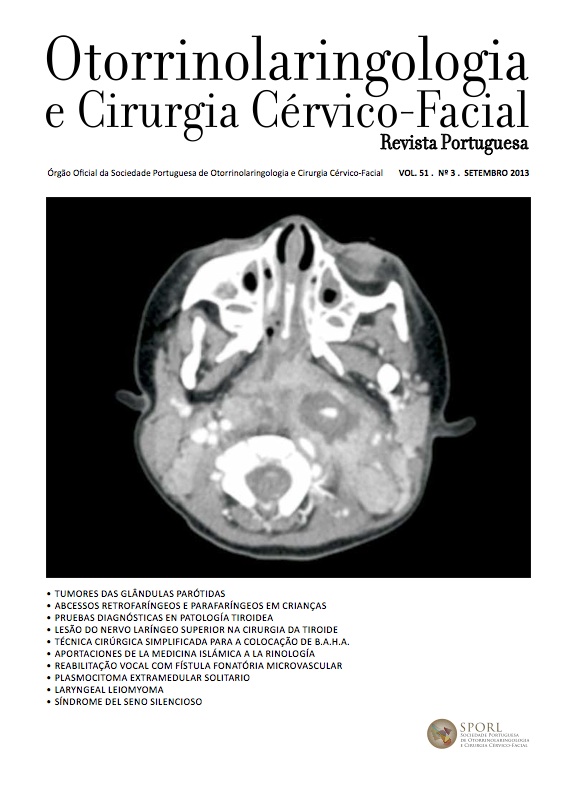Clinical results of the simplified surgical technique for B.A.H.A. implants
DOI:
https://doi.org/10.34631/sporl.65Keywords:
Bone-anchored Hearing Aid, Simplified Surgical TechniqueAbstract
Objectives: Retrospective analysis of the simplified surgical technique done with a linear incision for the osteotintegrated B.A.H.A implants, we present the clinical results and complications.
Study: Retrospective study of 20 patients from may 2009 until January 2011
Material and methods: The surgical technique is a variation of the original described by Nijmegen in which the procedure begins with a linear incision, in the skin, similar to the incision of the retro auricular incision for a masotidectomy, followed by a removal of the soft tissue until we reach the periostium. The authors present the clinical indications, surgical results and complications.
Results: This technique is a fast and simple procedure that can reduce the number of minor complications such as skin necrosis or formation of granulation tissue. In 3 patients there was and extrusion of the implant and in 4 others we registered some minor complications like granulation tissue around the implant. There were no major complications.
Conclusion: Tit is a very simple procedure that reduces the operation time and hose complications are easy to solves and relatively rare. we consider this an improvement on the classical procedure for this kind of implants.
Downloads
References
Tjellström A, Lindström J, Hallen O, et al. Osseointegrated titanium implants in the temporal bone. A clinical study on bone-anchored hearing aids. Am J Otol 1981; 2:304-10.
Lustig LR, Arts HA, Brackmann DE, et al. Hearing rehabilitation using the BAHA bone-anchored hearing aid: results in 40 patients. Otl Neurotol 2001; 22:328-34.
Wasen JJ, Spitzer JB, Ghossaini SN, et al. Tran cranial contra lateral cochlear stimulation in unilateral deafness. Otolaryngol Head Neck Surg 2003; 129:248-54.
Tjellström A. Surgery for the bone –anchored hearing aid. Goteborg Medical Service Video Library 1987; 17-87.
Tjellström A. Percutaneous implants in clinical practice. CRC Crilt Rev Biocompat 1985; 205-28.
Tjellström A., Granström G. On-stage procedure to establish osteointegration: a zero to five years follow-up report. J laryngol Otol 1995; 109:593-98.
Tejellström A, Hakansson B. The bone–anchored hearing aid. Design principles, indications, and long-term clinical results. Otolaryngol Clin North Am 1995; 28:53-72.
Mylanus EAM, Cremers CWRJ. A one-stage surgical procedure for placement of percutaneous implants for the bone-anchored hearing aid. JLaryngol Otol 1994; 108:1031-5.
Mylanus EAM, Beynon AJ, Snik AFM, Cremers CWRJ. Percutaneous titanium implantation in the skull for the bone-anchored hearing aid. J Invet surg 1994; 7:327-32.
Daumau-Galofre J., Tamarit-Conejeros J.M., Murcia-Puchades V, Pons-Rocher F., Pastor-Canicio G. BAHA: nueva incisión longitudinal con implante fuera de ésta. Axta Otorrinolaringol Esp. 2009; 60(4):278-282.
Carlsson P, Hakaansson B, Rosenhall U, Tejellström A., A speech- to-noise ratio test with the bone-anchored hearing aid: a comparative study. Otolaryngol head neck Surg 1986; 94:421-6.
Niparko JK, Cox KM, Lusting LR, Comparison of the bone-anchored hearing aid implantable hearing device with contralateral routing of offside signal amplification in the rehabilitation of unilateral deafness. Otol Neurotol 2003; 24:73-8.
Wazen JJ, Spitzer JB, Ghossaini S, et al. Transcranial contralateral cochlear stimulation in unilateral deafness. Otorryngol Head Neack Surg 2003; 129:248-54.
Hol Mk, Bosman AJ, Snick AF, Mylanus EA, Cremers CW. Bone anchored hearing aids in unilateral inner ear deafness: an evaluation of audiometric and patient outcome measurements. Otol Neurotol 2005; 26:999-1006.
Hol MK, Snick AF, Mylanus EA, Cremers CW. Long term results of bone-anchored hearing aids. Arch Otoryngol Head Neck Surg 2005; 131:321-5.
Tjellström A, Granström G. Long term follow-up with the bone- anchored hearing aid: a review of the first 100 patients between 1977 and 1985. Ear Nose Throat J 1994; 73:112-4.
Holgers KM, Tjellström A. Bjursten LM, et al. Soft tissue reactions around percutaneous implants: a clinical study of soft tissue conditions around skin-penetrating titanium implants for the bone-anchored hearing aids. Am J Otol 1988; 9:56-9.
Wazen JJ, Young DL, Farrugia MC, Chandrasekhar SS, Ghossaini Sn, Borik J, et al. Successes and complications on the BAHA system. Otol Neurotol. 2008; 29: 1115-9.
Stalfors J, Tjellström A. Skin reaction after BAHA surgery: A comparison between the U-graft technique and the BAHA dermatome. Otol Neurotol. 2008; 29:1109-14.
Tjellström A, Hakansson B, Graström G. Bone-anchored hearing aids. Current status in adults and children. Otolaryngol Clin North Am. 2001; 34:337-63.






